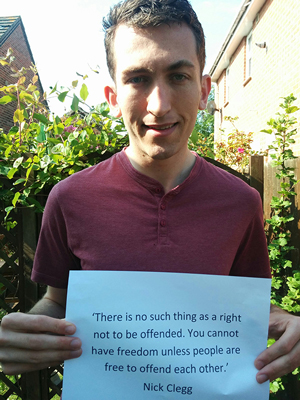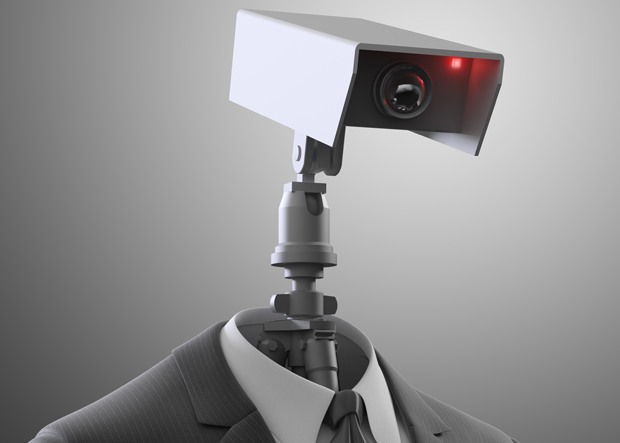17 Aug 2015 | mobile, News and features, United Kingdom, Youth Board
The new cohort of the Index on Censorship youth advisory board was launched last month. The board is already participating in discussions on Facebook.
Members of the board were asked to write a blog discussing one free speech issue in their country. The resulting posts exhibit a range of challenges to freedom of expression globally, from UK crackdowns on speakers in universities, to Indian criminal defamation law, to the South African Film Board’s newly published guidelines.
In the first of a series of posts, youth board member Matthew Brown explores mass surveillance in the UK.

Matthew Brown is a member of the Index youth advisory board. Learn more.
I don’t often begin writing by quoting Herman Goering but on one account he was worryingly accurate. Goering stated that: “The people can always be brought to the bidding of the leaders. All you have to do is tell them they are being attacked and denounce the pacifists for lack of patriotism and exposing the country to danger. It works the same way in any country.”
Increasing levels of surveillance are often justified as essential in protecting us from imminent attack but the recent revelation that GCHQ spied illegally on Amnesty International, an organisation relying upon the secrecy of their communications with human rights defenders, demonstrates the extent to which state surveillance methods are now out of control.
It is easy to scorn states known for their dictatorial regimes but our society has only progressed to its current position through holding the state to account. If we fail to continue to do so, then the slide towards a world in which freedom of expression is restricted at any given moment the government decides appropriate is inevitable. The interception of the correspondence of NGOs raises the worrying question of how these organisations can continue their crucial work if their confidential correspondence is likely to end up out of their hands.
Matthew Brown, UK
Related:
• Tom Carter: No-platforming Nigel
• About the Index on Censorship youth advisory board
• Facebook discussion: no-platforming of speakers at universities
25 Mar 2014 | Digital Freedom, Events

(Image: Shutterstock)
Index on Censorship, in association with Doughty Street Chambers, invites you to attend our high-level panel discussion asking who runs the internet?
At a moment when the revelations on NSA and GCHQ mass surveillance are opening up a wide debate about our digital freedoms, our panel will discuss how free the net is today, and the main challenges that lie ahead. In the next couple of years, major international summits will debate new rules on internet governance, and whether to adopt a top-down approach as favoured by China and Russia, or maintain a more open, multistakeholder networked approach. Meanwhile, from the EU to Brazil, reactions to the Snowden’s revelations of mass snooping suggest there is a growing risk of fragmentation of the internet, with calls for forced local hosting of data.
We are delighted to be hosting speakers:
Bill Echikson – Head of Free Expression EMEA, Google
Richard Allan – Head of Europe, Middle East and Africa, Facebook
Tusha Mittal – formerly a correspondent for Tehelka and currently a Fellow at the Reuters Institute, Oxford University
Kirsty Hughes – CEO, Index on Censorship
The panel will make short introductory remarks ensuring plenty of time for a lively Q&A session.
The event will be held at Doughty Street Chambers (53-54 Doughty St, London WC1N 2LS) on Wednesday 2nd April 6-7.30pm, followed by a drinks reception. To RSVP please fill in your details here. If you have any questions please contact Fiona Bradley ([email protected]).
29 Jan 2014 | Digital Freedom, News and features, Politics and Society, Religion and Culture

The revelations by Edward Snowden last June about massive, unaccountable surveillance by the US National Security Agency (NSA) and its British counterpart GCHQ have raised one vital question. Is there a global right of privacy? If so, what form might it take?
In November 2013, Kenneth Roth, the executive director of Human Rights Watch, argued in favour of a global human right of privacy. “All [governments] should acknowledge a global obligation to protect everyone’s privacy, clarify the limits on their own surveillance practices (including surveillance of people outside their own borders), and ensure they don’t trade mass surveillance data to evade their own obligations.”
Fundamental to this discussion is the role technology has played in outpacing legal oversight. In April 2013, the report of the United Nations Special Rapporteur on the promotion and protection of the right to freedom of opinion and expression had one express focus: To examine “the implications of states’ surveillance of communications in the exercise of the human rights to privacy and to freedom of opinion and expression.” In the Rapporteur’s view, it was clear that the march of technology, with its move to low cost mobile communications as opposed to previous fixed-line methods had “increased opportunities for state surveillance and interventions into individuals’ private communications.” Borderless surveillance has become a reality.
In their remarkable article on privacy in the Harvard Law Review of 1890, Louis D. Brandeis and Samuel D. Warren argued that, “The press is overstepping in every direction the obvious bounds of propriety and decency. Gossip is no longer the resource of the idle and the vicious, but has become a trade”. Through sharp, analogical reasoning, the jurists decided that grounds for a civil wrong in breaching privacy might be found. The law had to keep pace with the type of technology involved. In their times, it was the telegraph.
International law accepts that a right to privacy exists and should be protected. Article 12 of the Universal Declaration of Human Rights (1948) makes it explicit. The International Covenant on Civil and Political Rights, through Article 17, has the same effect. Article 8 of the Convention for the Protection of Human Rights and Fundamental Freedoms has spawned rich jurisprudence on the subject. The Organisation for Economic Cooperation and Development, and the Council of Europe, have various guidelines and protocols in place for data protection.
That said, common law countries such as Britain and Australia have shown a reluctance to find a genuine civil wrong when someone’s privacy is violated. Preference is given to finding a breach of confidence. In the United States, there is a reasonable expectation under the Fourth Amendment that one’s privacy will be protected, though it has no application to foreigners. Civil code countries have shown a greater willingness to identify the human body as inviolable before unwarranted interference.
Analysts have argued that a protected global right to privacy is urgent because the global surveillance state has itself become a reality. It is not merely sufficient to restrain through warrant and judicial control the actions of the NSA regarding American citizens. As David Cole of the Georgetown University Law Centre argues (Just Security, Oct 29, 2013), focus must lie beyond the limited social contract between US government and its citizens. The rights of non-US citizens to privacy, in other words, extra-territorial rights, matter. Privacy rights are transnational issues, requiring transnational measures of protection.
In the United States, President Barack Obama has at least acknowledged the globalised nature of the surveillance problem, and the need for global protections that consider the rights of non-US citizens as well. His latest suggestions can be found in Presidential Policy Directive 28 (PPD-28.
A notable feature in PPD-28 is the restriction on monitoring foreign citizens, which might be termed the “Merkel” clause after it was revealed that the German Chancellor’s phone was being monitored by the NSA. Section 4 of PPD-28 also serves to create the machinery by which the US will form a “point of contact for foreign governments who wish to raise concerns regarding signals intelligence activities conducted by the United States.”
In these proposals, Obama fails, as executive director of Amnesty International USA Steven W. Hawkins explains, to accept “the abusive nature of mass surveillance or put international human rights standards at the centre of US policy”. They do not so much curtail surveillance as simply limit aspects of its reach. Executive Order 12333 still affords Obama powers to authorise surveillance programs without judicial review. The law is still kept at arm’s length.
The normalisation of Stasiland is the great feature of the twenty first century – no political system has been spared that, largely because the technological means have outpaced the legal regulations. A collective of some 500 writers, among them Margaret Atwood, Martin Amis, and Don DeLillo, have argued via a petition in December 2013 that, “A person under surveillance is no longer free; a society under surveillance is no longer a democracy. To maintain any validity, our democratic rights must apply in virtual as in real space.” It is time to consider not merely limits to the bulk surveillance, but enforceable obligations on the part of states to abide by a global rule on privacy.
This article was posted on 29 January 2014 at indexoncensorship.org
5 Nov 2013 | Digital Freedom, News and features, United Kingdom

(Photo: David von Blohn / Demotix)
German and British MPs last night called for NSA whistleblower Edward Snowden to be granted asylum in Germany.
Addressing a meeting called to support the Guardian newspaper in the face of threats from the British government, Conservative MP David Davis said that safeguards for whistleblowers were the only way to protect civilians from an overreaching surveillance and security apparatus, adding that “If whistleblowers can look forward to a life in Germany rather than a life in Moscow, I think that would improve things for everybody.”
German Green Party MP Konstantin Von Notz had earlier said that his country “needed to grant political asylum to Edward Snowden.”
The issue of surveillance has been hotly debated in Germany since it was revealed that the United States’ National Security Agency had been monitoring Chancellor Angela Merkel’s phone.
But speakers at the London meeting, convened by Observer and Vanity Fair journalist Henry Porter, expressed concern that a similar debate was not taking place in the United Kingdom.
Conservative MP Rory Stewart suggested that parliament’s intelligence and security committee should be openly elected and led by an opposition MP, thereby encouraging greater scrutiny of the security services’ actions.
“You are never going to have a government backbencher chairing a committee that is going to criticise the government properly,” said Stewart, a member of the Foreign Affairs Committee and a former diplomat.
Addressing Prime Minister David Cameron’s suggestion that measures would need to be taken to prevent the Guardian from publishing further revelations about surveillance by US and UK authorities, Davis said that no government in any other country where the stories had been published had attacked newspapers in the way the UK government had attacked the Guardian. He said “the only reason [the government] is doing this is out of embarrassment.”
The meeting, held at the Royal Institute for British Architects, heard from English PEN director Jo Glanville, who criticised David Cameron’s dismissal of civil liberties concerns about surveillance as “la-di-da” and “airy-fairy”. Davis echoed that sentiment, saying he delighted in being called “la-di-da” by old Etonian Cameron.




